China Arts & Entertainment
Why Zhao Wei? Vicky Zhao’s Name Removed from China’s Online Channels
Recent developments involving Chinese top actress Vicky Zhao (Zhao Wei) are part of a bigger crackdown on China’s entertainment industry.
Published
3 years agoon
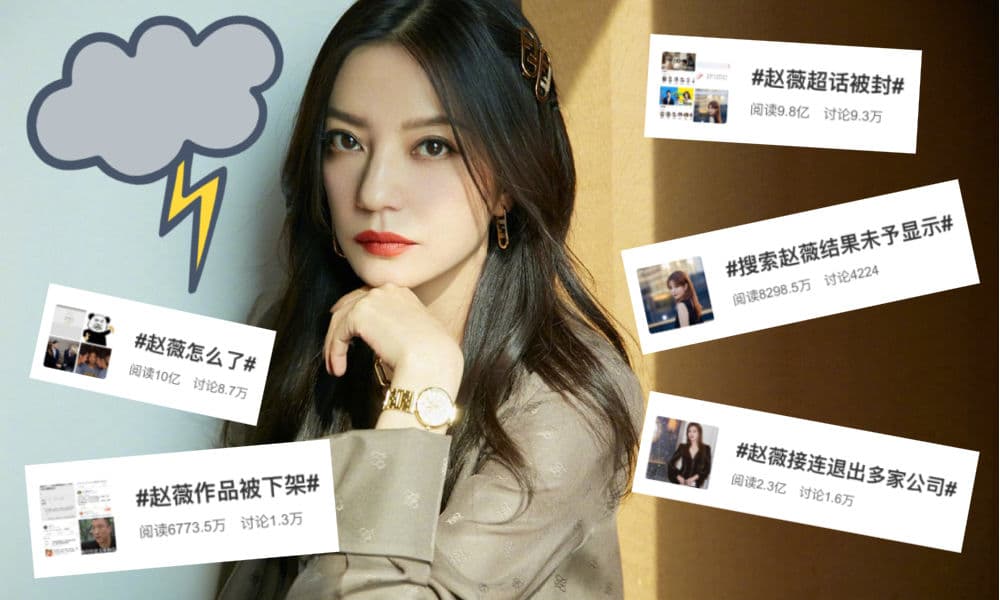
Another earthquake in China’s entertainment circles! This time, the name and works of one of the country’s most notable actresses, Zhao Wei (赵薇, aka Vicky Zhao) are removed from Chinese online channels.
“Sorry, no related videos found.” Searching for Zhao Wei’s name (赵薇/Vicky Zhao) on Chinese video platforms Tencent Video, iQiyi, and Youku comes up with zero results as of August 26 of 2021.
Zhao Wei’s sudden disappearance from the top websites to watch Chinese TV dramas has sent shockwaves over social media, where Zhao is among the top Chinese celebrities. On Weibo alone, the actress has over 85.6 million followers.
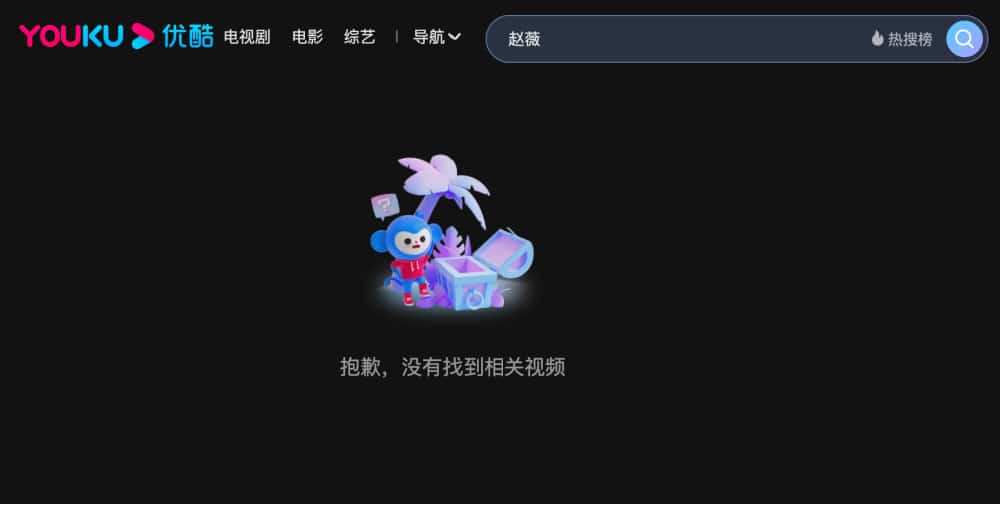
No more Vicky Zhao on Youku.
Zhao Wei (1976) is a Chinese film star, singer, entrepreneur, and director. Together with actresses Zhang Ziyi (章子怡), Zhou Xun (周迅) and Xu Jinglei (徐静蕾), she belongs to China’s ‘Four Dan Actresses’ (四大花旦, the four greatest actresses of mainland China) from the early 2000s.
She starred in the highly successful Chinese costume television show My Fair Princess (还珠格格) which first aired in 1998, after which she went on to star in many TV series and big films, including Painted Skin (2008) and Lost in Hong Kong (2015).
Besides being a known ambassador for good causes, Zhao is also known for her work as a brand ambassador for various international companies, which has added to her wealth. She was named the world’s wealthiest working actress by Forbes in 2015. Zhao is married to the Chinese businessman Huang Youlong (黄有龙), with whom she has a daughter. The couple made it to a list of the world’s wealthiest young billionaires in 2016.
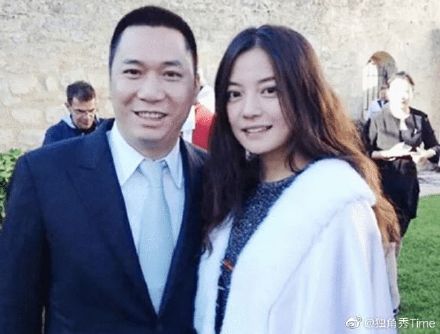
This week, Zhao’s name was deleted from the cast lists of various films and dramas she starred in or directed. A super-topic (fan group) dedicated to her was removed from Weibo, and now various productions involving Zhao have seemingly been removed altogether.
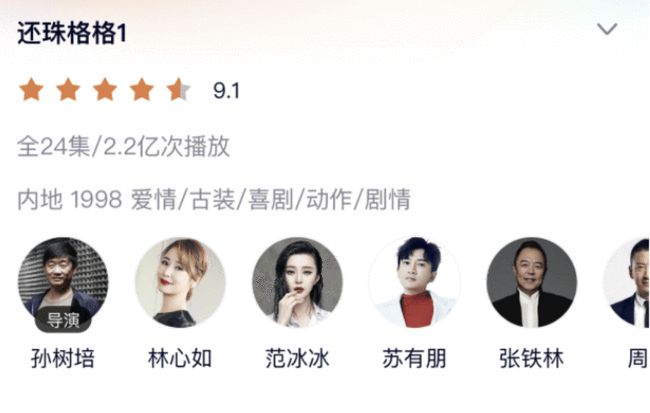
Zhao Wei is no longer listed as a member of the cast.
Zhao Wei reportedly also withdrew as a shareholder from several companies she was involved in.
On Weibo, the hashtag “Zhao Wei Withdraws from Companies” (#赵薇接连退出多家公司#) received over 240 million views on Friday. Another related topic, namely “Zhao Wei’s Super Topic Shut Down” (#赵薇超话被封#) received over 970 million views. Many people want to know why the actress has become the target of official scrutiny.
Chinese state media platform Global Times also wrote about how Zhao Wei’s name and works were removed from several video platforms. These online companies reportedly confirmed the removal of Zhao’s works, saying they received the request at a short notice and without a clear reason.
Among the potential reasons mentioned for Zhao’s name being censored is that it is somehow linked to the scandal involving the fallen Hangzhou Party chief Zhou Jiangyong (周江勇), who is currently being investigated by China’s top anti-graft agency. Zhao and Zhou share a social circle, including Jack Ma, an ally of Zhou and a friend of Zhao and her husband, who are major shareholders of Alibaba Pictures.
Another issue mentioned is that of Chinese actor Zhang Zhehan (张哲瀚) who recently came under fire for attending a wedding at a controversial Japanese shrine and taking pictures at Yasukuni, a shrine that is seen as representing Japanese militarism and aggression. Zhang – who is now basically banned from China’s entertainment industry – was signed under Zhao Wei’s company. Zhao herself also got caught up in history-related controversy as early as 2001, when she posed for a photo shoot wearing a dress printed with the old Japanese naval flag.
Throughout the years, Zhao has been caught up in various controversies. Back in 2016, it was rumored that the actress had financially backed Hillary Clinton when she was still running for president of the United States.
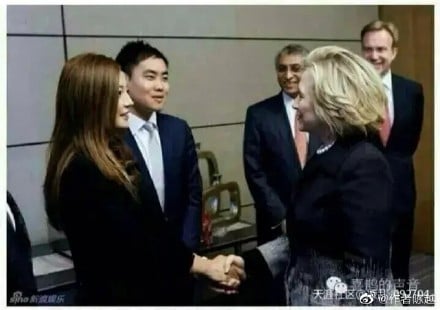
Vicky Zhao and Hilary Clinton.
But the actual reasons why Zhao is being banned from China’s online channels are still unclear. As of Friday night, Beijing time, Zhao’s Weibo page was still up. Her last social media post is from August 15, when the actress commemorated the 76th anniversary of Japan’s surrender.
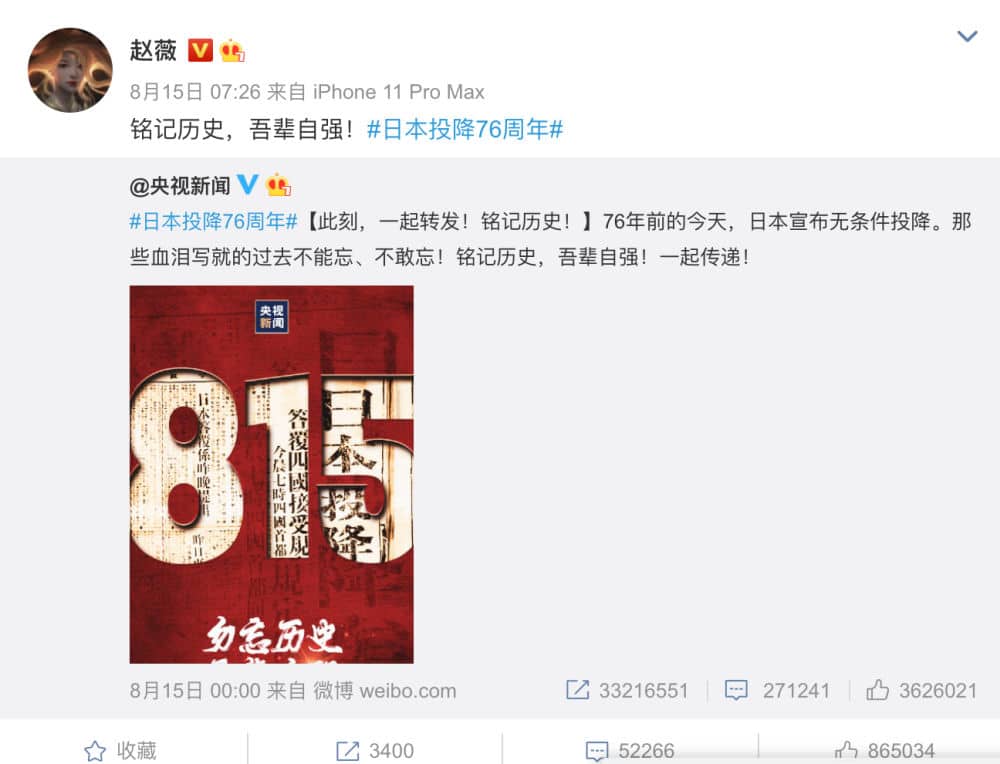
Meanwhile, some of Zhao’s celebrity friends, including Huang Xiaoming and Yang Zi, have deleted photos they took together with Zhao Wei from their social media channels.
The developments involving Zhao come at a time when various Chinese celebrities are under scrutiny. What’s on Weibo recently reported the scandal involving Kris Wu and the calls for ‘raising the bar’ for celebrities in China. Online fan clubs (or fan circles 饭圈) have also become a target of online censors, with thousands of posts and accounts removed from Chinese social media earlier in August of 2021.
Chinese actress Zheng Shuang (郑爽), whose ‘surrogacy scandal’ caused a social media storm in January of this year, also became a trending topic once again. On Friday, authorities stated that she would be fined 299 million yuan ($46.1 million) for tax evasion and undeclared income between 2019 and 2020. The actress published a public apology in which she stated she would pay for all taxes and fines.
Meanwhile, many people are glued to their social media screens. Around seven o’clock at Friday night, Beijing time, the Weibo topic “What’s up with Zhao Wei?” (#赵薇怎么了#) had already been viewed over a billion times.
Some commenters think that Zhao Wei is simply caught up in this storm because she was involved in so many controversies throughout the years and that the recent crackdown on China’s celebrity and fan circles is just the right timing for authorities to take finally take measures.
“This goes beyond being canceled,” others wrote: “There is something bigger going on, we will just have to wait for an announcement to come out.”
Read more: 25 ‘Tainted Celebrities’: What Happens When Chinese Entertainers Get Canceled?
By Manya Koetse (@manyapan)
With contributions by Miranda Barnes
Spotted a mistake or want to add something? Please let us know in comments below or email us. First-time commenters, please be patient – we will have to manually approve your comment before it appears.
©2021 Whatsonweibo. All rights reserved. Do not reproduce our content without permission – you can contact us at info@whatsonweibo.com.
Manya is the founder and editor-in-chief of What's on Weibo, offering independent analysis of social trends, online media, and digital culture in China for over a decade. Subscribe to gain access to content, including the Weibo Watch newsletter, which provides deeper insights into the China trends that matter. More about Manya at manyakoetse.com or follow on X.

You may like
Chinese Movies
The Unstoppable Success of Ne Zha 2: Breaking Global Records and Sparking Debate on Chinese Social Media
Everyone’s talking about Ne Zha 2—from in-depth online analyses to the booming market surrounding the film.
Published
20 hours agoon
February 22, 2025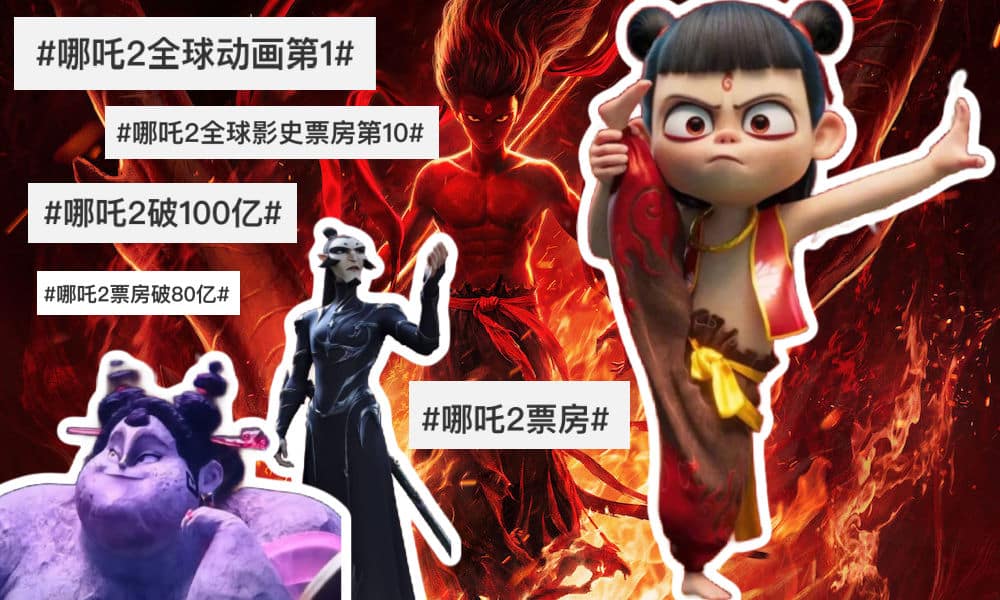
China’s animated blockbuster Ne Zha 2 (哪吒之魔童闹海) is smashing box office records and igniting debates on Chinese social media—from its most popular supporting characters to the question of which town can truly claim Nezha as its own.
The Chinese animation blockbuster Ne Zha 2 (哪吒之魔童闹海) has been a major point of discussion in China recently—not just for the movie itself, but also for its box office performance, which has become a hot topic on Weibo and beyond.
Just nine days after its release on January 29, Ne Zha 2 had already surpassed the 2021 film The Battle at Lake Changjin (长津湖), which had previously held the title of the highest-grossing Chinese film of all time—surpassing Wolf Warrior 2 (战狼2).

China’s top 3 highest-grossing movies: Ne Zha 2, Battle at Lake Changjin, and Wolf Warrior 2
In mid-February, Chinese netizens were eagerly anticipating Ne Zha 2 reaching the 10 billion yuan milestone (about $1.37 billion). At the time, the film had already grossed over 9.8 billion yuan ($1.35 billion), securing its place as the 17th highest-grossing film worldwide and the only non-Hollywood film in the top 20.
Now, the film’s global box office performance has surpassed all expectations: it has exceeded 15 billion yuan (about $2 billion), placing Ne Zha 2 among the top eight highest-grossing films of all time worldwide. On Tuesday, it already became the highest-grossing animated film in global history.
In response to the film’s overwhelming success, there have been all kinds of memes, trends, and hashtags on Chinese on social media.
The official Weibo account of The Battle at Lake Changjin published a post to congratulate Ne Zha 2 making new record for Chinese cinema history. This tradition is known as the “Box Office Champion Poster Relay,” originally initiated by Chinese director Xu Zheng (徐峥) in 2015 with the hope of fostering camaraderie and encouragement among filmmakers in China.

On February 6, the official Weibo account of The Battle at Lake Changjin published a post to congratulate Ne Zha 2 making new record for Chinese cinema history.
Earlier in February, Weibo users created the hashtag “The Least Educated Film Star of All Time” (#史上学历最低的影帝#) to celebrate Nezha—a 3-year-old mythological hero.
With the combined success of Nezha 1 and Nezha 2, they jokingly call Nezha the ‘youngest character’ to ever surpass the 10-billion-yuan box office milestone.
One popular comment said:
“Congratulations! The least educated film star in history (didn’t even finish kindergarten), and the youngest one to hold a 10-billion-yuan box office record, is our darling little Nezha.”
Nezha 2 is directed by Yang Yu (杨宇), also known as Jiaozi (饺子), and co-produced by Coco Cartoon (可可豆动画), Coloroom Pictures (彩条屋影业), and others. Released during the Spring Festival holiday, the film continues the storyline from its 2019 predecessor Nezha 1.
Based on Chinese mythology, the film follows the legendary figures Nezha (哪吒) and Ao Bing (敖丙), both characters from 16th-century classic Chinese novel Investiture of the Gods (封神演义). This narrative delves into the history of the Shang (c. 1600-c. 1046 BC) and Zhou (c. 1046-771 BC) dynasties, weaving together folklore, legends, and a variety of mythical beings and creatures.
Nezha and Ao Bing face a dire crisis—their souls remain intact, but their bodies are on the brink of disintegration. To save them, Nezha’s master, Taiyi Zhenren (太乙真人), plans to restore their forms using the mystical Seven-Colored Lotus.
The protagonist, Nezha, is a prominent figure from Chinese mythology and folklore. Besides in Investiture of the Gods, he also appears in Journey to the West (西游记). In Taiwan, Nezha is often revered as the “Third Prince” (三太子, Sān Tàizǐ), as he is the third son of Li Jing (李靖), also known as the Pagoda-Bearing Heavenly King Li (托塔李天王), in these mythological tales.

Ne Zha 2 promo image, China Daily.
Ne Zha 1 and Ne Zha 2 are not the first animated works centered around the character of Nezha.
The 1979 classic film Nezha Conquers the Dragon King (哪吒闹海), produced by Shanghai Animation Film Studio (上海美术电影制片厂), was China’s first large-scale color widescreen animated feature. It depicted Nezha’s conflict with the ‘Dragon King of the East Sea’ (东海龙王) and included the iconic scene where Nezha returns his bones to his father and flesh to his mother. His self-sacrifice in white robes is regarded as one of the most powerful moments in Chinese animation history. With its traditional Chinese aesthetics, this version of Nezha remains a beloved classic, particularly among those born in the 1970s and 1980s.

An important scene of “Nezha Conquers the Dragon King,” where Nezha is about to sacrifice himself to protect the people of Chentang Pass.
For those born in the 1990s and 2000s, childhood memories of Nezha are often linked to the 2003 animated TV series The Legend of Nezha (哪吒传奇), produced by China International Television Corporation. The theme song of this 52-episode series, “Young Hero Nezha” (少年英雄小哪吒), remains a nostalgic tune familiar to many from that era.
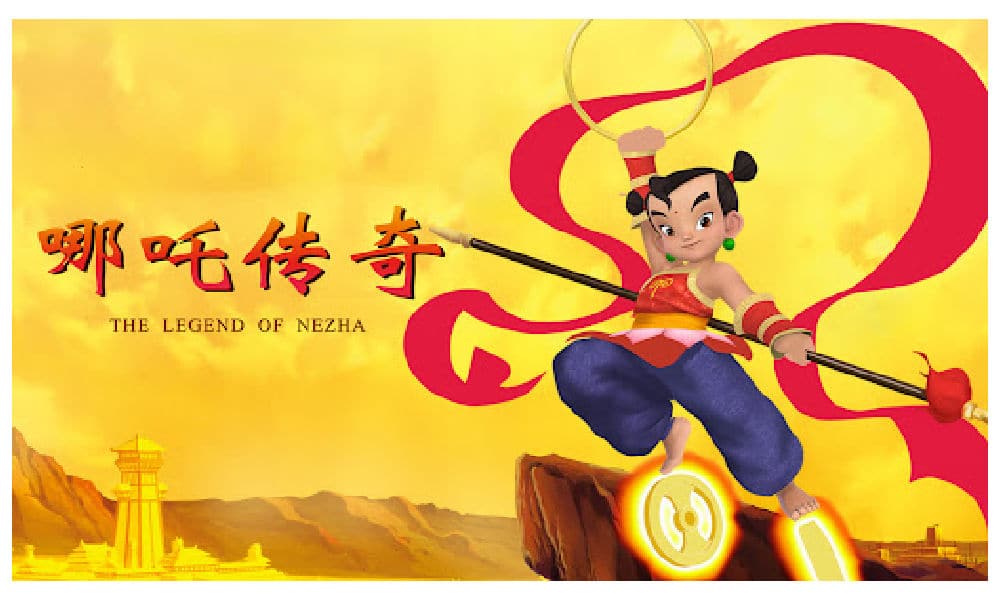
The Legend of Nezha
The shared cultural memory of Nezha, along with the overwhelmingly positive reception of Ne Zha 1 in 2019, has undoubtedly laid a strong foundation for the success of Ne Zha 2. Combined with five years of dedicated production—with some one-minute scenes taking up to six months (!) to conceptualize—it seems Ne Zha 2 was destined for cinematic success.
The Evolution of Nezha
Chinese audiences have had a variety of reactions to Ne Zha 2. Many viewers have expressed their love for the film, with some claiming to have watched it multiple times—some as many as six times—in different cinema formats to find the best viewing experience.
Some have found unique interpretations of some of the film’s details. Under various hashtags (e.g. #哪吒2隐喻引热议#), netizens actively discuss and analyze references in the film. These include a dollar sign-like symbol on the celestial artifact Tianyuan Ding (天元鼎) and scenes that seem to allude to the Bretton Woods system, sparking speculation that the film hints at global economic dynamics.
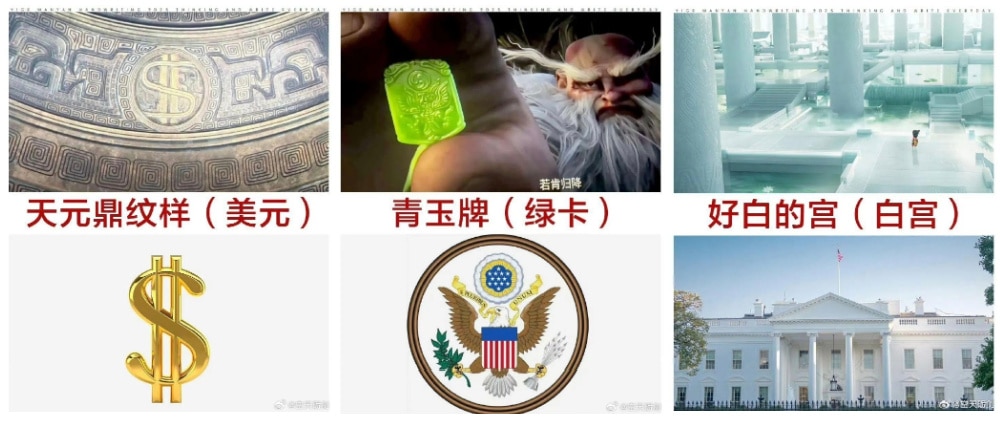
Hidden messages in Ne Zha 2? Some netizens think there are.
Not all feedback has been positive. Some viewers have criticized the film for how it prioritizes traditional values like filial piety in Nezha’s character rather than rebellion, feeling it does not really suit the spirit of his character.
One Weibo commenter (@我不是小日王) wrote:
“I’m not sure if I can say this, but honestly, I don’t really like the changes made to the story line in Nezha 2. In my memory, Nezha was not just the super strong and determined god of the Three Altar Sea Gathering, but also a lonely wanderer. Despite being deeply influenced by Confucian culture, where “filial piety is the greatest virtue” (百善孝为先), he still displayed rebellious behavior going against all morality by returning his flesh to his father and bones to his mother. He’s a genuine pioneer in rejecting patriarchal society (as referenced in Jiang Xun’s Six Lectures on Loneliness). But [in Nezha 2], to make him more relatable to the masses, he is forcibly portrayed as a filial, harmonious, superhero-like little boy.”
The movie’s fighting scenes and the depiction of Nezha as an overly reckless character have also drawn some disapproval. One Weibo user wrote:
“After watching the first film, I thought it was good—a troublemaking demon child defying fate to save the world. After going through so much, you’d at least expect some character growth. But in the second film, he’s still looking for trouble, throwing tantrums whenever he faces difficulties, and howling all the time. I honestly don’t see any charm in his character at all.”
Despite the success of Ne Zha 2, for those who already had a favorite version of Nezha, the changes to the character might be a bit harder to accept.
Beijing Business Newspaper (北京商报) recently posted an overview on Weibo of Nezha’s evolution, suggesting that “every generation has its own Nezha.” From the arrogant deity in the 1961 Havoc in Heaven (大闹天宫) to the defiant rebel in the 1979 Nezha Conquers the Dragon King (哪吒闹海) or the clever and courageous young hero in the 2003 The Legend of Nezha (哪吒传奇), the character has continuously evolved with the times.
From “Small-town Swot” to Stone Diva
It is not only the figure of Nezha that has dominated discussions surrounding Ne Zha 2. Some of the other characters in the film are also resonating with audiences and have become a popular topic of discussion on Chinese social media.
One of the most beloved characters is Shen Gongbao (申公豹). A villain in the first film, Ne Zha 2 adds more depth to his character, leading many viewers to empathize with his struggles.
As a hardworking overachiever with a stutter, not particularly born into privilege like many of the celestial figures in the film, some Chinese netizens suggest that he represents the experience of many “small-town swots” (xiǎozhèn zuòtíjiā 小镇做题家) in China.

Shen Gongbao (申公豹) has become China’s most beloved villain.
“Small-town swot” is a buzzword that has appeared on Chinese social media over the past few years, first popping up on a Douban forum. It refers to students from rural areas and small towns in China who put in immense effort to secure a place at a top university and move to bigger cities. While they may excel academically, even ranking as top scorers, they often struggle to gain social advantages, highlighting a deeper rural-urban divide in China.
Initially used in a self-deprecating manner, the term became a way for people from modest backgrounds to vent their frustrations and self-doubt, eventually striking a chord with many others.
There is now a series of hashtags about Shen Gongbao being a small-town swot (#申公豹 小镇做题家#, #申公豹丑强惨#, #申公豹 真男人#), all adding to the popularity of this character.
Another standout character is Lady Stone (石矶娘娘), a larger-than-life demon whom Nezha must overcome in his celestial trials. She has gained attention for her grand, imposing presence – a bold and diva-like figure who once was a stone.
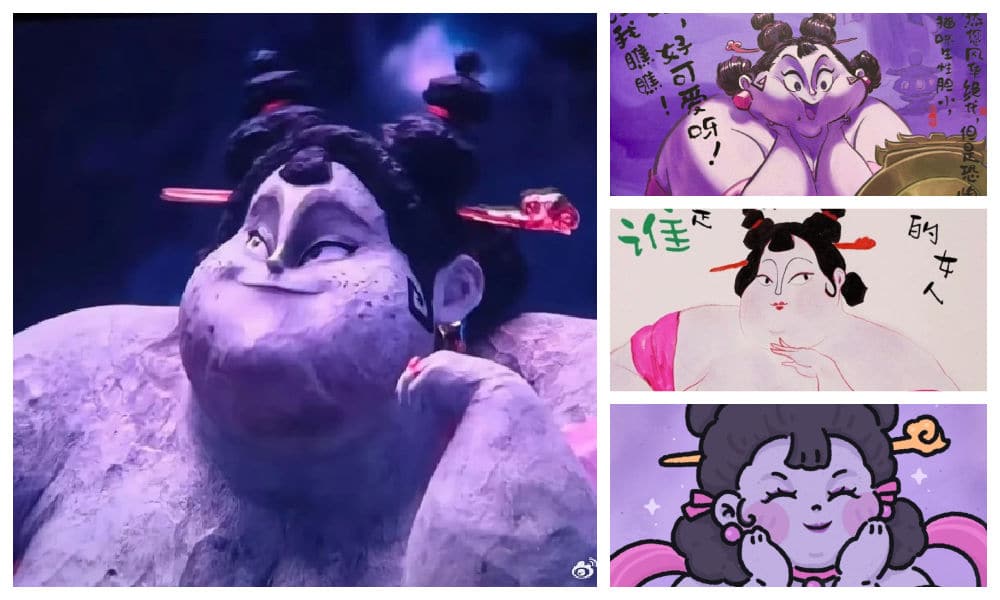
Lady Stone from Ne Zha 2, and the fan art dedicated to her.
Lady Stone first appears questioning a magic mirror about her beauty, and after being defeated by Nezha, she ultimately accepts her unique form. Some Chinese netizens see her as a challenge to traditional beauty standards, leading to the hashtag “Lady Stone Breaks Beauty Stereotypes” (#石矶娘娘打破白幼瘦审美枷锁#) and countless fan art contributions, celebrating her as a symbol of self-acceptance and female resilience.
The Rise of “Ne Zha Economy”
As the box office success of Ne Zha 2 continues to skyrocket, its economic impact is becoming increasingly evident.
By early February, the film had already generated most of the annual revenue for its production company, Enlight Media (光线传媒). The company’s shares hit an all-time high, soaring over 150% in just six trading days. With box office numbers still rising, Enlight Media’s profits are expected to grow even further, signaling a strong financial outlook.
The film’s success has also had a positive impact on cinema chains. Hengdian Entertainment (横店影视) hit the daily trading limit, while Wanda Film (万达电影) and Bona Film Group (博纳影业) saw their shares rise by over 6%. Other companies in the sector also experienced stock price gains.
Beyond the box office, Ne Zha 2 has driven a surge in related merchandise sales. The film’s characters appear in numerous commercial ads, and Pop Mart’s (泡泡玛特) Ne Zha 2 blind box figurines have been so popular that many stores are down to display items only. Pop Mart’s stock price also hit a new high, significantly boosting its market value.
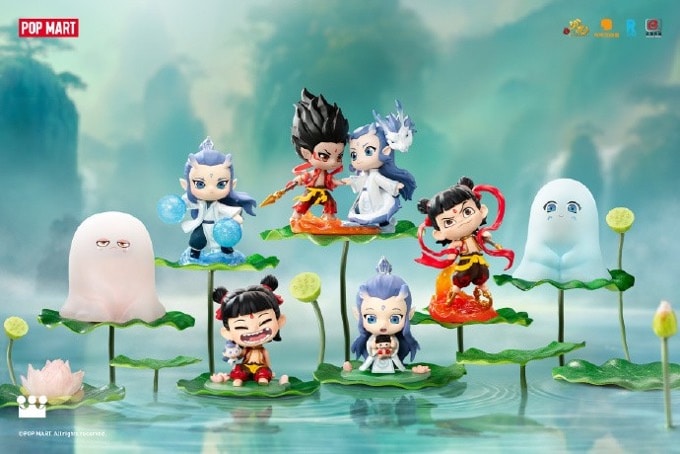
The Ne Zha 2 blind box figurines from Pop Mart.
In terms of tourism, several regions across China are also looking to capitalize on the film’s popularity. Since Chentang Pass (陈塘关), Nezha’s birthplace in Investiture of the Gods, lacks a clearly defined real-world location, multiple cities are hoping to claim the title of “Nezha’s hometown” (#多地争给哪吒上户口#).
Because Tianjin is a sea city that has a place called “Chentangzhuang”, it already started to promote itself on social media as being Nezha’s birthplace with the hashtag: “Nezha’s Hometown, Tianjin, Invites You to Visit” (#哪吒故里天津喊你来打卡#).
Meanwhile, residents of Chengdu argue that their city is Nezha’s true “home”, since Ne Zha 2 was registered in Chengdu, the director is a native of Sichuan, and the production team, Coco Cartoon, is based in Gazelle Digital Cultural and Creative Valley located in Chengdu’s Tianfu Software Park.
The film is undeniably a “Chengdu-made” production, with elements of Sichuan culture woven throughout, from Taiyi Zhenren’s Sichuan-accented Mandarin to the two Boundary Beasts that look like the bronze masks of Sanxingdui, and the bamboo chairs, covered tea bowls, and flying eaves of Sichuanese architecture in Chentang Pass.

The appearance of two Boundary Beasts (结界兽, Jie2 Jie4 Shou4) is inspired by the bronze masks of Sanxingdui.
For cities with no claim to Nezha’s birthplace, local tourism campaigns have instead spotlighted Nezha temples as must-visit attractions.
How ‘International’ is Ne Zha’s Global Success?
What’s still in store for Ne Zha 2? The Chinese film industry analytics platform Maoyan predicts that the final box office earnings for Ne Zha 2 in mainland China could reach 16 billion yuan ($2.2 billion).
If this figure becomes a reality, the film wouldn’t just be the highest-grossing animated movie—it would also rank among the top five highest-grossing films in global box office history.
But how much of its box office success is truly global? Outside of China, Ne Zha 2 began its international release in mid-February 2025, with a limited release in markets like the United States, Australia, and New Zealand.
By February 20, Deadline reported that $1.72 billion of its earnings came from China alone, indicating that the vast majority of its box office revenue is domestically driven.
However, if anyone questions the significance of the international market’s contribution to Ne Zha 2’s success, they might receive a response similar to that of Wu Jing (吴京), director of the Wolf Warrior (战狼) series. When faced with skepticism about Wolf Warrior 2 making it into the top 100 global box office hits despite 99% of its earnings coming from mainland China, he simply replied:
“So what? That’s still money” (#所以呢 不是钱吗#).
By Wendy Huang
Follow @whatsonweibo
With contributions from Manya Koetse and edited for clarity
Spotted a mistake or want to add something? Please let us know in comments below or email us. Please note that your comment below will need to be manually approved if you’re a first-time poster here.
©2024 Whatsonweibo. All rights reserved. Do not reproduce our content without permission – you can contact us at info@whatsonweibo.com
China ACG Culture
“Black Myth: Wukong”: From Gaming Screens to the CMG Spring Festival Gala?
Published
1 month agoon
January 21, 2025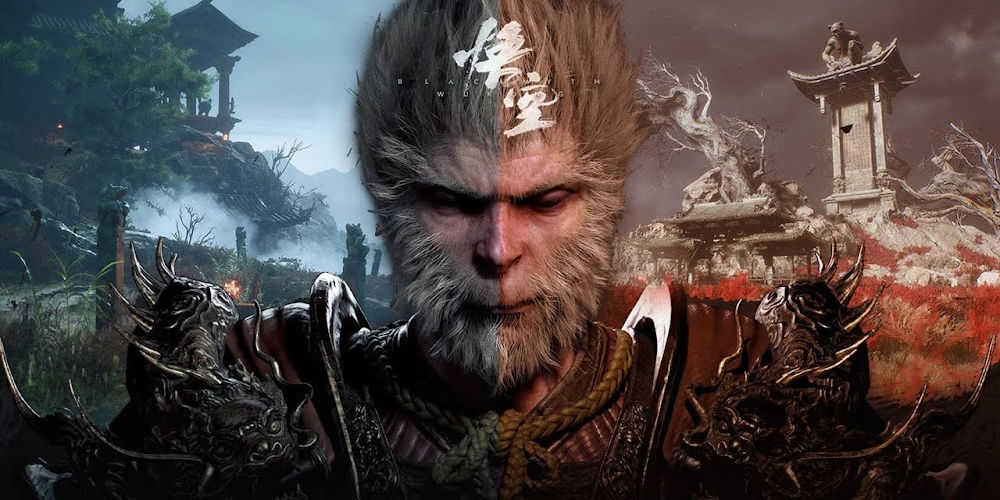
FROM THE WEIBO WATCH PREMIUM NEWSLETTER
Is Chinese game sensation ‘Black Myth Wukong’ making a jump from gaming screens to the CMG Spring Festival Gala? There’s already some online excitement over a potential performance at the biggest liveshow of the year.
The countdown to the most-watched show of the year has begun. On January 29, the Year of the Snake will be celebrated across China, and as always, the CMG Spring Festival Gala, broadcast on CCTV1, will air on the night leading up to midnight on January 28.
Rehearsals for the show began last week, sparking rumors and discussions about the must-watch performances this year. Soon, the hashtag “Black Myth: Wukong – From New Year’s Gala to Spring Festival Gala” (#黑神话悟空从跨晚到春晚#) became a topic of discussion on Weibo, following rumors that the Gala will feature a performance based on the hugely popular game Black Myth: Wukong.
Three weeks ago, a 16-minute-long Black Myth: Wukong performance already was a major highlight of Bilibili’s 2024 New Year’s Gala (B站跨年晚会). The show featured stunning visuals from the game, anime-inspired elements, special effects, spectacular stage design, and live song-and-dance performances. It was such a hit that many viewers said it brought them to tears. You can watch that show on YouTube here.
While it’s unlikely that the entire 16-minute performance will be included in the Spring Festival Gala (it’s a long 4-hour show but maintains a very fast pace), it seems highly possible that a highlight segment of the performance could make its way to the show.
Recently, Black Myth: Wukong was crowned 2024’s Game of the Year at the Steam Awards. The game is nothing short of a sensation. Officially released on August 20, 2024, it topped the international gaming platform Steam’s “Most Played” list within hours of its launch. Developed by Game Science, a studio founded by former Tencent employees, Black Myth: Wukong draws inspiration from the classic Chinese novel Journey to the West. This legendary tale of heroes and demons follows the supernatural monkey Sun Wukong as he accompanies the Tang Dynasty monk Xuanzang on a pilgrimage to India to retrieve Buddhist scriptures. The game, however, focuses on Sun Wukong’s story after this iconic journey.
The success of Black Myth: Wukong cannot be overstated—I’ve also not seen a Chinese video game be this hugely popular on social media over the past decade. Beyond being a blockbuster game it is now widely regarded as an impactful Chinese pop cultural export that showcases Chinese culture, history, and traditions. Its massive success has made anything associated with it go viral—for example, a merchandise collaboration with Luckin Coffee sold out instantly.
If Black Myth: Wukong does indeed become part of the Spring Festival Gala, it will likely be one of the most talked-about and celebrated segments of the show. If it does not come on, which we would be a shame, we can still see a Black Myth performance at the pre-recorded Fujian Spring Festival Gala, which will air on January 29.
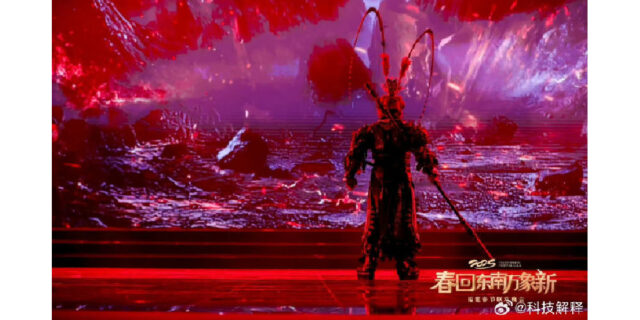
Lastly, if you’re not into video games and not that interested in watching the show, I still highly recommend that you check out the game’s music. You can find it on Spotify (link to album). It will also give you a sense of the unique beauty of Black Myth: Wukong that you might appreciate—I certainly do.
By Manya Koetse
(follow on X, LinkedIn, or Instagram)
Spotted a mistake or want to add something? Please let us know in comments below or email us. First-time commenters, please be patient – we will have to manually approve your comment before it appears.
©2025 Whatsonweibo. All rights reserved. Do not reproduce our content without permission – you can contact us at info@whatsonweibo.com.
What’s on Weibo Chapters
Subscribe

The Unstoppable Success of Ne Zha 2: Breaking Global Records and Sparking Debate on Chinese Social Media

From Weibo to RedNote: The Ultimate Short Guide to China’s Top 10 Social Media Platforms

Collective Grief Over “Big S”

Tuning Into the Year of the Snake

The ‘China-chic Girl’ Image and the Realities of China’s Competitive Food Delivery Market

Our Picks: Top 10 Chinese Buzzwords and Phrases of 2024 Explained

“Dear Li Hua”: The TikTok/Xiaohongshu Honeymoon Explained

Why Chinese Hit Movie “Her Story” is ‘Good Stuff’: Stirring Controversy and Celebrating Female Perspectives

Chiung Yao’s Suicide Farewell Letter: An English Translation

12-Year-Old Girl from Shandong Gets Infected with HPV: Viral Case Exposes Failures in Protecting Minors

Breaking the Taboo: China’s Sanitary Pad Controversy Sparks Demand for Change

Weibo Watch: Christmas in China Is Everywhere and Nowhere

Weibo Watch: A New Chapter

Weibo Watch: China’s Online Feminism Is Everywhere

Story of Chinese Female MA Graduate Going Missing for 13 Years Sparks Online Storm
Get in touch
Would you like to become a contributor, or do you have any tips or suggestions? Get in touch here!
Popular Reads
-

 China Insight10 months ago
China Insight10 months agoThe Tragic Story of “Fat Cat”: How a Chinese Gamer’s Suicide Went Viral
-

 China Music11 months ago
China Music11 months agoThe Chinese Viral TikTok Song Explained (No, It’s Not About Samsung)
-

 China Insight12 months ago
China Insight12 months agoThe ‘Two Sessions’ Suggestions: Six Proposals Raising Online Discussions
-

 China Digital9 months ago
China Digital9 months agoChina’s 2024 Gaokao Triggers Online Discussions on AI




